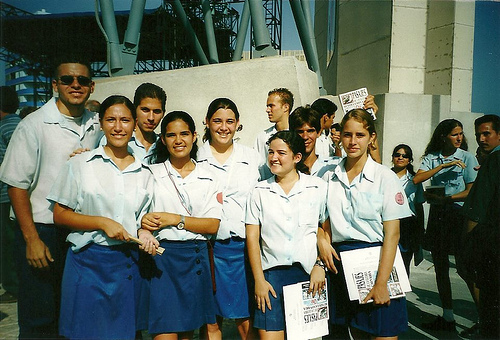While the entire government of Bolivarian Venezuela moves its necrophilic headquarters to Havana, the people of Cuba use the Raul regime’s reforms to sell their cars and houses in exchange for a passport and visa to any other place, with the bonus-track of an airline ticket. The first, is called annexation; the second plebiscite (in both cases, silent comedies).
The annexation began in 1992 with a brainstorming of internationalist or interventionist ideas that culminated in the scripted television coup in Caracas, followed by the mea culpa of the starring comandante in that remake of the assault on the Moncada Barracks and History Will Absolve Me.
Then came the red-shirt political-parody revolution in the style of “Hello, Big Brother*,” before returning now to the concept of a cancercoup d’etat with a veneer of constitutional continuity (a constitution they are determined to edit like a miniature biblical socialist Tree of Knowledge permanently blandished on the small screen by this or that continental caudillo).
The plebiscite this January 1st marked 54 years of enthronement on the Island. It is the Cubans who are leaving. First, because for decades it was impossible to go. And now, because suddenly it’s only possible to go. They are voting with their feet, at the first opportunity, losing this Paradise Found in Made in Castro Cuba. Although no one is now stigmatized as “scum,” rather, in any case, as “elite.”
God tries to call Hugo Chavez to his side and standing in the way are the babalawos, protestant pastors and Cuban cardinals (there’s no need to reduce to one the rhetorical faces of Jaime Ortega y Alamino). Of course, the proletarian petrocracy depends on another — and worse — crisis not erupting in Cuba like that of the “Special Period**,” this time not “in times of peace” but probably of uncivil war.
So, the rights of almost half of Venezuelan citizens — who just voted at the polls against the convalescing Chavez — are not at all convenient for Cubans. Nor does it suit us to evoke an initiative known as the Heredia Project, launched six years ago in Cuba by the Christian Liberation Movement, in which are enshrined, among others, the travel and immigration rights of our nation, some of which are disguised today as the Raul reforms without so much as citing their author, Oswaldo Paya Sardinas (the dead to the grave, the living to the airport).
We have absolutely no use for the rights of Cubans, not for the many Cubans on the Island as well as in exile, be they puppets of the ruling class or leaders of the opposition. In practice, totalitarianism is useful for its uncompromising governability and the openness to certain privileges under central control.
Like children caught in the gap between personal ethics and the Daddy State, the chatter of democracy terrifies us or makes us laugh. The real resistance has never been against the dictatorship. Rather, we have fought tooth-and-nail knees-to-the-ground to make our slavery more comfortable. Indeed, to violate slightly (another) Milanese poet, better we should drown ourselves in the sea than betray the coarseness in which we have lived.
“I am Chávez” is the slogan of the popular-made lemmings and putschists dauphins of the United Socialist Party of Venezuela. “I am the Revolution,” was the end-of-century end-of-millennium slogan launched by then First Secretary of the Communist Party of Cuba, Fidel. Two post-monarchical statements that could not be more sincere. Whoever does not fit in this elementary logic does not fit into the status quo and, sooner or later, must be eliminated however indirectly, thanks to the Marti-inspired anathema that “there are things which, to accomplish them, must remain hidden” (it’s called holocaust-by-eyedropper).
So the palaces of Caracas have become obsolete and the presidents of the New Ark of ALBA are portrayed in Revolution Square in Havana (they too are terrified and laugh). So today it would be a crime against leftanity to free the animals in the zoo who have only known captivity and, rather than demand reforms, we appreciate the protectorate.
Orlando Luis Pardo Lazo
Translator’s note:
* Hugo Chavez had a long-running unscripted television talk show called “Hello, President.”
**The deep crisis Cuba faced after the fall of the Soviet Union and the loss of its huge subsidy was called, by Fidel Castro, “a special period in times of peace.”
Translated from DiariodeCuba.com
January 15 2013

